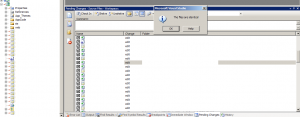UPDATE: 3 July 2008
Updated code to reflect more recent tax tables (2009)
When I was asked to estimate PAYE on a gross monthly salary, i hauled out the calculator and started chipping away, according to the SARS Tax Tables. Not being a tax consultant or looking at various structured packages, the first stab is mostly always a straightforward estimate without investigating further deductions. While doing this, the math-programmer inside me went… “Mmmm. Calculator. Boring. Ruby. Smile”
Turns out, it’s a simple little script; a useful little snippet and, bonus, i migrated some more learning onto Ruby. An aside; there’s definitely something about the difference in speed and endurance of learning between my brain versus my hands. You know the feeling. You can forget a password mentally, but let your fingers do the talking… And utilising muscle memory as an aid is just one of the many senses you can draw on…
Back to the snippet. Not too much interesting going on in terms of code. I chose a multidimensional array for storing the tax table. First used a hash, found it was overkill, reverted. Also did a classic switch in the beginning, to determine which “bracket” your pay falls into, but then figured a straightforward loop works just as well. This was an interesting break in habits from C# however.
In C#, looping through an array would be: for(int ii=0;ii<array.length-1;ii++)
I did the same in Ruby, transliterated the code, first time round: for ii in 0..array.length-1
But then, the knowledge of the “times” method changed my thinking completely: 6.times { |ii| … }
There are, afterall, one of 6 tax brackets you are likely to fall in (for all positive salaries)
And that’s where it hit me: the uncomfortable (more about that later) shift away from a corporate-sponsored, statically typed, IDE-integrated, certificate-oriented, compilable(?) programming language into a community-driven, dynamic scripting language is underpinned by these sudden ferocious rushes of freedom. Too much freedom? Certainly, too much to what i’m accustomed to sometimes.
Why’s that uncomfortable? Well, MSDN, VS, MS communities and the framework tell you how to code- to a large extent. They dictate the patterns, the constructs, the idioms; in short, they impose a very definite way of doing things. And it’s a big abstraction layer, forever changing (but not really) and giving you tons of resources to make your coding easier. This is good. Books, online help, built-in help, IDEs, intellisense… and more of all the good stuff. Don’t get me wrong, these things made me very productive and i’m grateful for that. But then you break away from that.
You gotta search for help (no nicely packaged MSDN DVD delivered to your door). You gotta scratch under the hood. You have to engage with community blogs and real people in a virtual world. You are forced to read opinions. You are stripped to the only the most simple of tools- a plain text editor. On a coding level, you are forced to remember namespaces, method names, variable names, libraries… no more intellisense to rely on. And this is where it was difficult. No more crutches to help me be more productive. I had to start thinking- for real now- and remembering stuff. And then i got scared: what if the “community” changed something and i didn’t know about it- or worse, didn’t agree with it? And I didn’t get an email with an updated change delivered to me automatically via updates or DVD? Hang on! Is that really the way it’s supposed to be? Have i become that lazy? Oops.
And all i was doing was having some fun, writing a little script to calculate PAYE so that next time someone asks me, i save myself a little more time.
Btw, the Source Code is here, if you’re interested.

